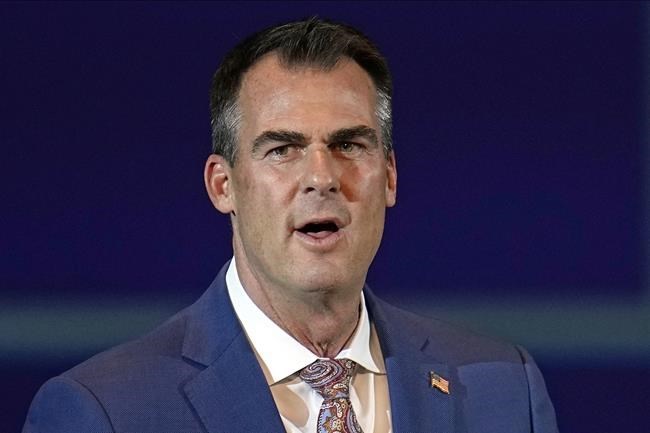McALESTER, Okla. (AP) — Oklahoma executed a man Thursday who claimed he acted in self-defense when he shot and killed two men in Oklahoma City in 2001.
Phillip Dean Hancock, 59, received a three-drug lethal injection at the Oklahoma State Penitentiary and was declared dead at 11:29 a.m. His execution went forward once Republican Gov. Kevin Stitt declined to commute his sentence, despite a clemency recommendation from the state’s Pardon and Parole Board.
“I can’t imagine the anxiety that Phillip Hancock must have felt as Governor Stitt again waited until beyond the last minute to reject clemency," the Rev. Don Heath, chair of the Oklahoma Coalition to Abolish the Death Penalty, said in a statement.
A spokeswoman for Stitt did not immediately respond to a message seeking comment on the governor’s decision to deny clemency or why it was delayed until after the execution's scheduled start time of 10 a.m. The execution did not begin until after 11 a.m.
Hancock, while strapped to the gurney inside the execution chamber, thanked his legal team and reiterated his claim that the killings were in self-defense. He added that he hoped to be exonerated after his death.
Hancock also criticized Attorney General Gentner Drummond's office, which handled Hancock's post-conviction prosecution.
“They’re vile. They’re virtueless. They’re without honor," Hancock said.
Drummond, who witnessed the execution, did not appear to react.
Hancock had long claimed he shot and killed Robert Jett Jr., 37, and James Lynch, 58, in self-defense after the two men attacked him inside Jett’s home in south Oklahoma City. Hancock’s attorneys claimed at a clemency hearing this month that Jett and Lynch were members of outlaw motorcycle gangs and that Jett lured Hancock, who was unarmed, to Jett’s home. A female witness said Jett ordered Hancock to get inside a large cage before swinging a metal bar at him. After Jett and Lynch attacked him, his attorneys said, Hancock managed to take Jett’s pistol from him and shoot them both.
“Please understand the awful situation I found myself in,” Hancock told members of the Pardon and Parole Board via a video feed from the penitentiary. “I have no doubt they would have killed me. They forced me to fight for my life.”
Hancock’s lawyers also have said his trial attorneys have acknowledged they were struggling with substance abuse during the case and failed to present important evidence.
“We are profoundly sad that Oklahoma executed Phil for protecting himself from a violent attack," Hancock’s attorney, Shawn Nolan, said a statement issued after the execution. "This was a clear case of self-defense and the Governor and the state ignored a wealth of evidence showing that Phil was fighting for his life.”
Attorneys for the state had argued that Hancock gave shifting accounts of what exactly happened and that his testimony didn’t align with physical evidence.
Assistant Attorney General Joshua Lockett also cited a witness who testified that after Hancock shot Jett inside the house, he followed him into the backyard. There, the witness said, a wounded Jett said: “I’m going to die.” Hancock responded, “Yes, you are,” before shooting him again, Lockett said.
“Chasing someone down, telling them you are about to kill them and then doing it is not self-defense,” Lockett said.
Jett’s brother, Ryan Jett, said after the execution was over that both his and Lynch's family had waited more than 20 years for Hancock's execution.
“We’ve waited a long time for justice to be served,” Jett said.
Hancock also was convicted of first-degree manslaughter in a separate shooting in 1982 in which he also claimed self-defense. He served less than three years of a four-year sentence in that case.
Hancock is the fourth Oklahoma inmate to be executed this year and the 11th since Oklahoma resumed executions in October 2021 following a nearly six-year hiatus resulting from problems with lethal injections in 2014 and 2015. Oklahoma has executed more inmates per capita than any other state since the 1976 reinstatement of the death penalty.
The next execution scheduled in Oklahoma is James Ryder on Feb. 1. Ryder was sentenced to death for the 1999 killing of Daisy Hallum, 70, and to life without parole for killing her son, Sam Hallum, 38, in Pittsburg County.
Sean Murphy And Jake Bleiberg, The Associated Press



